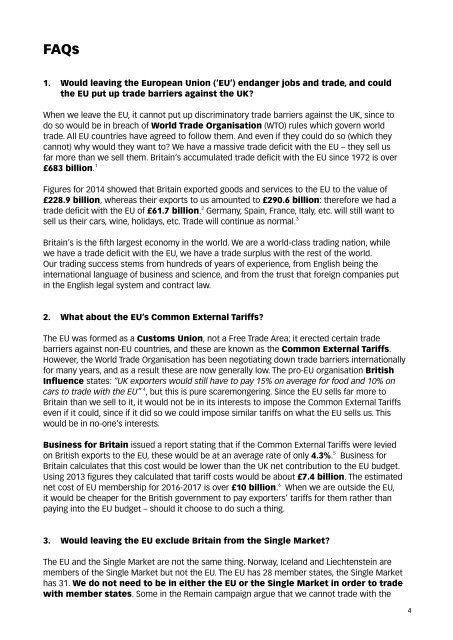EU Referendum FAQ v4
For those undecided in which way to vote in the EU referendum,this addresses the main questions and concerns people have
For those undecided in which way to vote in the EU referendum,this addresses the main questions and concerns people have
Create successful ePaper yourself
Turn your PDF publications into a flip-book with our unique Google optimized e-Paper software.
<strong>FAQ</strong>s<br />
1. Would leaving the European Union (‘<strong>EU</strong>’) endanger jobs and trade, and could<br />
the <strong>EU</strong> put up trade barriers against the UK?<br />
When we leave the <strong>EU</strong>, it cannot put up discriminatory trade barriers against the UK, since to<br />
do so would be in breach of World Trade Organisation (WTO) rules which govern world<br />
trade. All <strong>EU</strong> countries have agreed to follow them. And even if they could do so (which they<br />
cannot) why would they want to? We have a massive trade deficit with the <strong>EU</strong> – they sell us<br />
far more than we sell them. Britain’s accumulated trade deficit with the <strong>EU</strong> since 1972 is over<br />
£683 billion. 1<br />
Figures for 2014 showed that Britain exported goods and services to the <strong>EU</strong> to the value of<br />
£228.9 billion, whereas their exports to us amounted to £290.6 billion: therefore we had a<br />
trade deficit with the <strong>EU</strong> of £61.7 billion. 2 Germany, Spain, France, Italy, etc. will still want to<br />
sell us their cars, wine, holidays, etc. Trade will continue as normal. 3<br />
Britain’s is the fifth largest economy in the world. We are a world-class trading nation, while<br />
we have a trade deficit with the <strong>EU</strong>, we have a trade surplus with the rest of the world.<br />
Our trading success stems from hundreds of years of experience, from English being the<br />
international language of business and science, and from the trust that foreign companies put<br />
in the English legal system and contract law.<br />
2. What about the <strong>EU</strong>’s Common External Tariffs?<br />
The <strong>EU</strong> was formed as a Customs Union, not a Free Trade Area; it erected certain trade<br />
barriers against non-<strong>EU</strong> countries, and these are known as the Common External Tariffs.<br />
However, the World Trade Organisation has been negotiating down trade barriers internationally<br />
for many years, and as a result these are now generally low. The pro-<strong>EU</strong> organisation British<br />
Influence states: “UK exporters would still have to pay 15% on average for food and 10% on<br />
cars to trade with the <strong>EU</strong>” 4 , but this is pure scaremongering. Since the <strong>EU</strong> sells far more to<br />
Britain than we sell to it, it would not be in its interests to impose the Common External Tariffs<br />
even if it could, since if it did so we could impose similar tariffs on what the <strong>EU</strong> sells us. This<br />
would be in no-one’s interests.<br />
Business for Britain issued a report stating that if the Common External Tariffs were levied<br />
on British exports to the <strong>EU</strong>, these would be at an average rate of only 4.3%. 5<br />
Business for<br />
Britain calculates that this cost would be lower than the UK net contribution to the <strong>EU</strong> budget.<br />
Using 2013 figures they calculated that tariff costs would be about £7.4 billion. The estimated<br />
net cost of <strong>EU</strong> membership for 2016-2017 is over £10 billion. 6<br />
When we are outside the <strong>EU</strong>,<br />
it would be cheaper for the British government to pay exporters’ tariffs for them rather than<br />
paying into the <strong>EU</strong> budget – should it choose to do such a thing.<br />
3. Would leaving the <strong>EU</strong> exclude Britain from the Single Market?<br />
The <strong>EU</strong> and the Single Market are not the same thing. Norway, Iceland and Liechtenstein are<br />
members of the Single Market but not the <strong>EU</strong>. The <strong>EU</strong> has 28 member states, the Single Market<br />
has 31. We do not need to be in either the <strong>EU</strong> or the Single Market in order to trade<br />
with member states. Some in the Remain campaign argue that we cannot trade with the<br />
4







